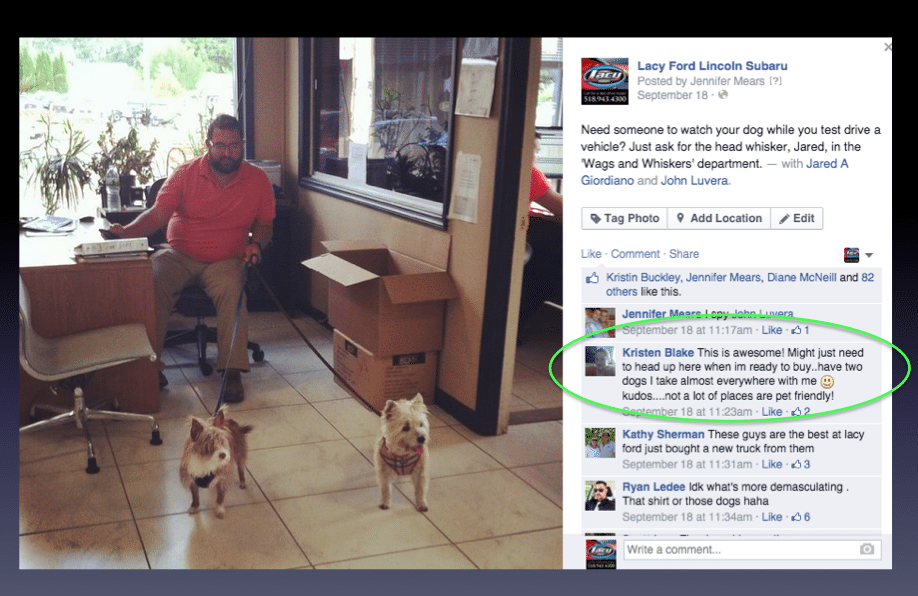 Social Selling is the art of using technology to attract and engage prospects, grow referrals and retain customers. Success in Social Selling does not come easy.
Social Selling is the art of using technology to attract and engage prospects, grow referrals and retain customers. Success in Social Selling does not come easy.
It’s a process that not every business is ready for. Its processes need to come from the top through superior leadership and training. Only then can Social Selling become part of your business’ daily operations.
I just returned from the Digital Dealer conference where I spoke about ways to get traffic, leads and sales from Social Media. Part of your success in Social Media marketing depends greatly on how engaged your employees are in what I like to call “hyper-local content.”
Hyper-local content consists of examples from inside your store or business that show why people buy from you. Here’s a great example from one of my clients. This is just a simple picture of a car salesperson watching a customer’s dogs while they’re on a test drive. The positive results from a post like this are many:

- This act of kindness speaks volumes about trust. Not only from the customer but with other’s researching their next purchase.
- People want to shop on their terms. Sometimes, they bring their dogs with them. The picture says, we welcome you and care about your needs.
- Inside the green circle: “This is awesome! Might just need to head up here when I’m ready to buy…have two dogs I take almost everywhere with me. Kudos…not a lot of places are pet friendly!” This is proof that, when done right, hyper-local content attracts other prospects.
During my four days at the conference, I heard arguments against Social Selling. These are valid concerns coming from those that haven’t yet realized that 95% of consumers go online first when researching their purchase. Some are even still stuck solely in their online ads world, not recognizing that a good portion of consumers don’t click on banner ads.
I just had an owner call me who’s been spending $45,000 per month on Google adwords and Pay-per-Click. He told me that his phones aren’t ringing like they used to three years ago. All the signs are pointing to a shift in your organizations’ need to explore collaborative marketing and sales. Salespeople marketing themselves and participating in the organization’s content strategy is how businesses are able to prosper today.
Success in Social Selling requires a certain type of culture. There were 3 main arguments I heard at the conference and they were similar to the questions I get regularly wherever I go.
1. Your Company Culture.
For years, some dealers and other businesses have treated employees as liabilities. I worked for a guy once who would scream obscenities on the showroom floor when customers were around. He hated everyone and let me know that regularly.
Today, employees are trusted by the consumer more than any other position in your business. Why wouldn’t you want them out there representing you? A business owner who doesn’t value his or her employees’ expertise and contribution, most likely doesn’t value their customers either. If you take a look in the mirror and see this type of person, Social Selling is not right for your organization. Your company culture must be ready for prime time if you want success in Social Selling.
2. “So, once I’ve paid these salespeople to access Social Media and/or learn Social Selling, what’s to stop them from taking my customers and going elsewhere?”
Nothing.
That’s why it’s mega-important to have a solid plan and strategy in place. If you behave like the boss I mentioned above, retaliation is a valid concern. However, most don’t behave that way and employees want to stay in an environment that helps them succeed.
3. “How can we protect ourselves from rogue salespeople who post inappropriate things on Social Media?”
Make sure you have a good Social Media Policy in place so that everyone knows what they can and can’t say. Remember, your employees know their boundaries when they use other forms of communication – in person, on the phone and email. Social is just another layer.
When you have a strong process in place to attract and engage prospects, grow referrals and retain customers, employees stay within those boundaries. They want to sell more (and so do you), so the more help and guidance you give them, the more things keep moving forward.
Consider these obstacles to your success in Social Selling – see if they sound like something you’re struggling with and take action. My hope is that you can overcome these obstacles and embrace the power of success in Social Selling.
If you need help, I’m ready to be your Social Selling sherpa.
